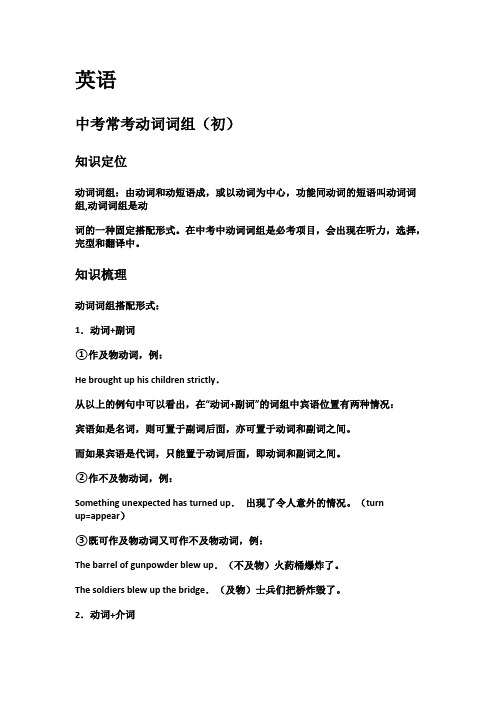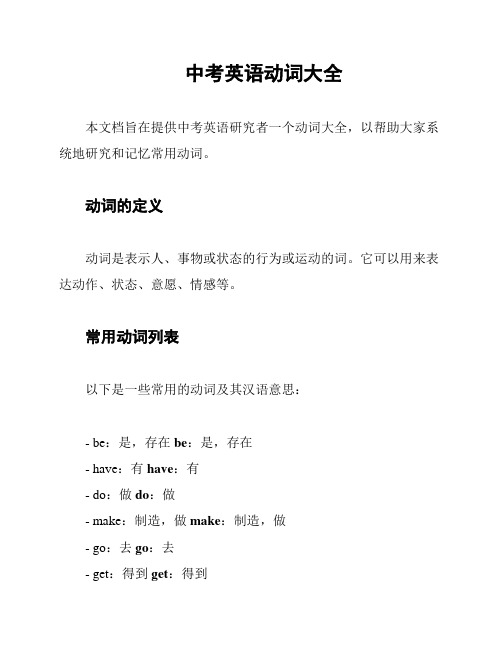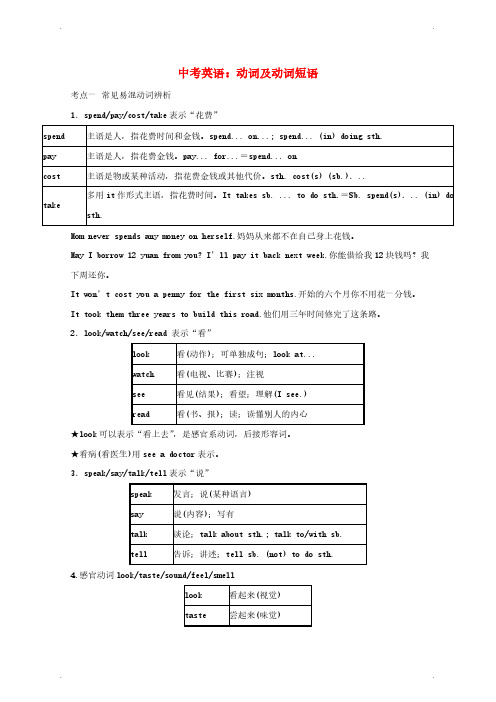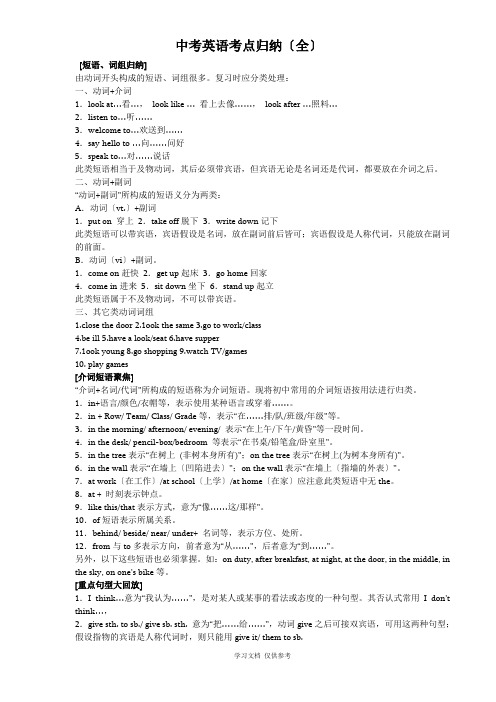中考英语复习动词及动词词组
2024年中考英语专题复习精练—动词词组(2)

2024年中考英语专题复习精练—动词词组(2)中考真题:1.(2023·江苏扬州·统考中考真题)Paper cut-outs of “double happiness” are often ________ in the married couple’s home to bring good wishes.A.put back B.put up C.put on D.put off【答案】B【详解】句意:“双喜字”的剪纸经常被贴在新婚夫妇的家里,以表达美好的祝愿。
考查动词短语。
put back放回去;put up张贴;put on穿上;put off推迟。
“Paper cut-outs of ‘double happiness’ ”是一种剪纸,人们会把它贴在家里。
故选B。
2.(2023·天津·统考中考真题)Lisa is a popular monitor. She ________ her classmates and teachers. A.takes part in B.gets on well withC.gets into trouble with D.keeps clear of【答案】B【详解】句意:丽莎是一位受欢迎的班长。
她与同学和老师相处得很好。
考查动词短语。
takes part in参加;gets on well with相处得很好;gets into trouble with惹上麻烦;keeps clear of避开,不接触。
根据“Lisa is a popular monitor.”可知是和同学老师相处得很好。
故选B。
3.(2023·安徽·统考中考真题)Our team ________ what to do about the project and successfully completed it on time.A.gave up B.worked out C.turned down D.took away【答案】B【详解】句意:我们的团队制定出了这个项目的方案,并成功地按时完成了。
最全英语中考常考动词词组(初)

英语中考常考动词词组(初)知识定位动词词组:由动词和动短语成,或以动词为中心,功能同动词的短语叫动词词组,动词词组是动词的一种固定搭配形式。
在中考中动词词组是必考项目,会出现在听力,选择,完型和翻译中。
知识梳理动词词组搭配形式:1.动词+副词①作及物动词,例:He brought up his children strictly.从以上的例句中可以看出,在“动词+副词”的词组中宾语位置有两种情况:宾语如是名词,则可置于副词后面,亦可置于动词和副词之间。
而如果宾语是代词,只能置于动词后面,即动词和副词之间。
②作不及物动词,例:Something unexpected has turned up.出现了令人意外的情况。
(turnup=appear)③既可作及物动词又可作不及物动词,例:The barrel of gunpowder blew up.(不及物)火药桶爆炸了。
The soldiers blew up the bridge.(及物)士兵们把桥炸毁了。
2.动词+介词动词与介词构成的词组在词义上相当于一个及物动词,宾语总是在介词后面,例:I don’t much care for television.我不很喜欢电视。
(care for=like)3.动词+副词+介词在这类动词词组中,动词、副词、介词紧密结合,是动副词组和动介词组的合成体,词义上相当于一个及物动词。
它兼有以上两类短语动词的特点,但宾语总是位于介词之后,例:We must work hard to make up for lost time.我们必须努力工作来弥补失去的时间。
(make up for=compensate)4.动词+名词这类动词词组中的常见动词是have,take,give,make 等,后面的名词通常是从动词转化而来的动作名词,并表达了短语动词的真正意义,例:Let’s have another try.让我们再试一下。
中考英语动词大全

中考英语动词大全本文档旨在提供中考英语研究者一个动词大全,以帮助大家系统地研究和记忆常用动词。
动词的定义动词是表示人、事物或状态的行为或运动的词。
它可以用来表达动作、状态、意愿、情感等。
常用动词列表以下是一些常用的动词及其汉语意思:- be:是,存在be:是,存在- have:有have:有- do:做do:做- make:制造,做make:制造,做- go:去go:去- get:得到get:得到- say:说say:说- see:看见see:看见- take:拿,取take:拿,取- can:能够can:能够- will:将要will:将要- give:给予give:给予- find:找到find:找到- think:思考think:思考- know:知道know:知道- want:想要want:想要- need:需要need:需要- like:喜欢like:喜欢- love:爱love:爱- believe:相信believe:相信- say:说say:说- feel:感觉feel:感觉- work:工作work:工作- call:打电话call:打电话- try:尝试try:尝试- ask:问ask:问- use:使用use:使用- tell:告诉tell:告诉以上只是一部分常用动词的例子,你可以根据具体语境和需要进一步研究和掌握更多动词。
总结动词在英语研究中起着重要的作用,它们帮助我们表达动作、状态和情感。
通过系统地研究和练动词,我们能够提高自己的英语表达能力。
希望本文档对你的中考英语研究有所帮助!注意:本文档提供的动词仅供参考,可以根据自己的需要和研究进度进行扩展和调整。
中考英语必考知识点

中考英语必考知识点一、动词词组(包括短语动词)、介词词组和其他词组(一)1.由be构成的词组be good at 善于,擅长于 be careful of 当心,注意,仔细be covered with 被……复盖 be ready for 为……作好准备be surprised (at) 对……感到惊讶 be interested in 对……感到举be on 在进行,在上演, (灯)亮着be able to do sth. 能够做… be angry with sb. 生(某人)的气be pleased (with) 对……感到高兴(满意)be strict in (with) (对工作、对人)严格要求be from 来自……,什么地方人 be worried 担忧be covered with 被……所覆盖…… be in trouble 处于困境中 be made of (from) 由……制成be satisfied with 对……感到满意 be free 空闲的,有空be (ill) in bed 卧病在床 be glad to do sth. 很高兴做……be late for ……迟到2ee back 回来 e on 快,走吧,跟我来加油 5)e out出来出版e up 上来 e from 来自……3.dodo more speaking/reading 多做口头练习/朗读 doone's best 尽力do some shopping (cooking reading, cleaning)买东西(做饭菜,读点书,大扫除)do morning exercises 做早操do eye exercises 做眼保健操 do well in 在……某方面干得好4.get1)get ready for (=be ready for) 为……作好准备2)get on (well) with 与…相处(好)3)get back 返回 4)get rid of 除掉,去除 5)get in 进入,收集6)get on/off 上/下车 7)get to 到达 8)get there 到达那里5.give1)give sb. a call 给……打电话 2)give a talk 作报告3)give a lecture (a piano concert)作讲座(举行钢琴音乐会)4)give back 归还,送回5)give……some advice on 给……一些忠告6)give lessons to 给……上课 7)give in 屈服 8)give up 放弃9) give sb. a chance 给……一次机会6.go1)go ahead 先走,向前走,去吧,干吧 2)go to the cinema 看电影 3)go to bed 睡觉4)go to school (college) 上学(上大学) 5)go to (the) hospital 去医院看病6)go over 复习/ go over to 朝……走去7)go fishing/skating/swimming/shopping 去钓鱼/滑冰/游泳/买东西8)go home (there) 回家去(去那儿) 9)go round 顺便去,绕道走10)go up 上去 11)go out for a walk 外出散步12)go on (doing) 继续(做……)13)go upstairs/downstairs 上/下楼 14)(the lights) go out (灯)熄了7. havehave a football match (basketball match) 举行一场足球(蓝球)赛have a try 试一试 have a good/wonderful time 玩得很高兴 have a report (talk) on 听一个关于……的报告have breakfast/lunch/supper 吃早饭/午饭/晚饭have a meal (three meals) 吃一顿饭(三餐饭) have (have got) a headache 头痛have a fever 发烧have a cough (a cold) 咳嗽(感冒) have a look (at) 看一看……have a rest (a break) 休息一会儿(工间或课间休息) have a talk 谈话have a swim/walk 游泳/散步 have a sports meet (meeting) 开运动会 have something done 让人(请人)做……have a word with 与……谈几句话8.helphelp sb. with sth. help sb. do sth. 在……方面帮助…… 帮助……做help each other 互相帮助9.keep1)keep up with 跟上……,不落后于……2)keepsilent/quiet 保持沉默/安静3)keep sb. doing sth. 使……一直做……4)keep one's diary 记日记10.make1)make a noise (a lot of noise, much noise, noises)吵闹(十分嘈杂,响声)2)make a living 谋生 3)make sb. do sth. 让某人做……4)make faces (a face)做鬼脸5)make friends (with)与……交朋友 6)make a mistake (mistakes)犯错误7.make room/space for 给…腾出地方 8.make a sentence (sentences)with 用……造句9)make a fire 生火11.look1)look out of (outside) 往外看(看外面) 2)look up a word (in the dictionary) 3)look up 往上看,仰望 4)look after 照管,照看,照顾5)look for 寻找6)look like 看上去像7)look fine/well/tired/worried 看起来气色好/健康/疲劳/忧虑8)look out 当心,小心 10)look around 朝四周看11)look at 看着……12.put1)put on 穿上(衣服),戴上(帽子),上演(戏剧) 2)put up 建造,搭起,挂起,举起,张帖 4)put one's heart into 全神贯注于 put away 把…放好 put off 推迟 put out 灭火5)put…down… 把……放下13.set1)set up 竖起,建起 3)set out 出发3.)set an example for 为……树立榜样14.take1)take one's advice 听从某人劝告2)take out 拿出,取出3)take down 拿下4)take place 发生5)take one's place 坐……的座位,代替某人职务6)take the place of 代替……7)take a walk/rest 散步/休息8)take it easy 别紧张9)take care of 关心/照顾/保管10)take away 拿走 11)take off 脱下(衣,帽,鞋等)拿掉12)take (an active) part in (积极)参加(活动13)take photos 拍照14)take some medicine 服药 15)take a bus/train, boat/ 乘公共汽车,火车/船15.turn1)turn on 开,旋开(电灯,收音机等) 2)turn off 关上(电灯,收音机等)3)turn in 交出,上交 4)turn down (把音量)调低5)turn…over 把……翻过来重点句型1.I think…意为“我认为……”,是对某人或某事的看法或态度的一种句型。
【中考英语、英语语法】【人教版】中考英语动词及动词短语考点剖析

中考英语:动词及动词短语考点一常见易混动词辨析1.spend/pay/cost/take表示“花费”spend主语是人,指花费时间和金钱。
spend... on...; spend... (in) doing sth.pay主语是人,指花费金钱。
pay... for...=spend... oncost主语是物或某种活动,指花费金钱或其他代价。
sth. cost(s) (sb.)...多用it作形式主语,指花费时间。
It takes sb. ... to do sth.=Sb. spend(s)... (in) doin takesth.Mom never spends any money on herself.妈妈从来都不在自己身上花钱。
May I borrow 12 yuan from you? I’ll pay it back next week.你能借给我12块钱吗?我下周还你。
It won’t cost you a penny for the first six months.开始的六个月你不用花一分钱。
It took them three years to build this road.他们用三年时间修完了这条路。
2.look/watch/see/read 表示“看”look看(动作);可单独成句;look at...watch看(电视、比赛);注视see看见(结果);看望;理解(I see.)read看(书、报);读;读懂别人的内心★look可以表示“看上去”,是感官系动词,后接形容词。
★看病(看医生)用see a doctor表示。
3.speak/say/talk/tell表示“说”speak发言;说(某种语言)say说(内容);写有talk谈论;talk about sth.; talk to/with sb.tell告诉;讲述;tell sb. (not) to do sth.4.感官动词look/taste/sound/feel/smelllook看起来(视觉)taste尝起来(味觉)sound听起来(听觉)feel摸起来(触觉)smell闻起来(嗅觉)5.borrow/lend/keep表示“借”borrow借用;borrow sth. from sb.lend借给;lend sth. to sb.keep借用若干时间;keep... for 2 days6.hope/wish/expecthope希望;hope to to sth.; hope+that 从句wish但愿、希望;wish to do sth.; wish sb. to do sth.; wish+that 从句expect期待、期望; expect to do sth.; expect sb. to do sth.7.forget/leaveforget表示“忘记”时,forget通常不能与表示地点的副词或短语连用leave在表示“遗忘”时,通常要与表示地点的状语连用8.hear/listen/soundhear听见;hear+名词(强调听的结果)listen听;listen to+名词(强调听的过程)sound听起来; sound+形容词(强调听的效果)9.wear/put on/dress/be inwear“穿着;戴着”,强调状态,wear后可接穿戴的东西,包括眼镜、首饰等put on“穿上;戴上”,指“穿”的动作,反义词为“take off”“穿衣”,是及物动词,后接人作宾语,意为“给某人穿衣服”;dress onself“打扮;给自己穿dress衣服”be in表示状态,后接衣服,也可接表颜色的词10.reach/get/arrivereach“到达”,是及物动词(比get更正式),其后可直接接地点名词作宾语(不能用介词)get“到达”,不及物动词,之后通常接介词 toarrive“到达”,不及物动词,之后通常接介词 at (一般用于较小的地方)或 in (一般用于较大的地方)1.(2018·山东菏泽单县常青学校模拟三)—I meeting Jack today because I am still angry with him.—Come on, Mary. You are good friends.A.avoid B.expect C.enjoy2.(2018·广东普宁模拟改编)I don’t know the restaurant, but it’s to be quite a good one.A.said B.told C.spoken3.(2018·广西贵港港南二模改编)—How much money did he you yesterday?—500 yuan. I told him I would return it to him in three weeks.A.give B.borrow C.lend4.(2018·甘肃定西中考改编)—I can’t find my English textbook.—Is it possible that you it at home?A.lost B.forgot C.left5.(2018·四川泸州中考改编)It about eight minutes for the light to travel from the sun to the earth.A.costs B.spends C.takes考点二动词短语辨析常考的动词短语辨析有三种:第一种是同一动词的不同搭配;第二种是同一副词或介词与不同动词的搭配;第三种是完全不同的动词短语。
中考英语考点归纳(全)

中考英语考点归纳〔全〕[短语、词组归纳]由动词开头构成的短语、词组很多。
复习时应分类处理:一、动词+介词1.look at…看…,look like … 看上去像……,look after …照料…2.listen to…听……3.welcome to…欢送到……4.say hello to …向……问好5.speak to…对……说话此类短语相当于及物动词,其后必须带宾语,但宾语无论是名词还是代词,都要放在介词之后。
二、动词+副词“动词+副词”所构成的短语义分为两类:A.动词〔vt.〕+副词1.put on 穿上2.take off脱下3.write down记下此类短语可以带宾语,宾语假设是名词,放在副词前后皆可;宾语假设是人称代词,只能放在副词的前面。
B.动词〔vi〕+副词。
1.come on赶快2.get up起床3.go home回家4.come in进来5.sit down坐下6.stand up起立此类短语属于不及物动词,不可以带宾语。
三、其它类动词词组1.close the door2.1ook the same3.go to work/class4.be ill5.have a look/seat6.have supper7.1ook young 8.go shopping 9.watch TV/games10. play games[介词短语聚焦]“介词+名词/代词”所构成的短语称为介词短语。
现将初中常用的介词短语按用法进行归类。
1.in+语言/颜色/衣帽等,表示使用某种语言或穿着……。
2.in + Row/ Team/ Class/ Grade等,表示“在……排/队/班级/年级”等。
3.in the morning/ afternoon/ evening/ 表示“在上午/下午/黄昏”等一段时间。
4.in the desk/ pencil-box/bedroom 等表示“在书桌/铅笔盒/卧室里”。
常考动词词组(15张PPT)中考英语专题复习

中考考点直击
10.show sb. sth. 给某人看某物 show sb. around 带某人参观
感谢
中考考点直击
3.do one’s best 尽某人最大努力 do well in 在……方面做得好 do one’s homework 做作业 do some reading 阅读 dream of 梦想 dress up 装扮
中考考点直击
4.get on 上车 get to 到达
get back 回来;取回 get off 下车 get on/along well with与……相处融洽 get married 结婚 give out 分发 give away 赠送 give up 放弃
make phone calls 打电话 make a face/make faces 做鬼脸
make a decision 作出决定 make up one’s mind 下定决心
make progress 取得进步 make a difference 起作用,有影响
中考考点直击
8.put on 上演;穿上;戴上 put down 把……放下来
中考考点直击
3.动词+名词:常见的有have fun, play sports, take place等。这类动词词组相当于不及物动词。 This story took place three years ago. 这个故事发生在三年前。 4.动词+副词+介词:常见的有look down upon, go on with, add up to, catch up with, do well in, run out of等。 5.动词+名词+介词:常见的有take care of, pay attention to等。
2024年中考英语动词不定式短语归纳+练习

2024中考英语:动词不定式短语归纳+练习常见动词不定式词组、句型用法总结 .固定用法(非谓语动词):一.以下是带to的动词不定式常见搭配★希望做某事hope to do sth.★确定做某事decide to do sth.★同意做某事agree to do sth.★须要某人做某事need to do sth.★运用某物做某事use sth to do sth★迫不及待做某事can’t wait to do★准备做某事get/be ready to do★尽力/努力做某事try to do sth★安排做某事plan to do sth.★不得不have to do★轮番做某事take one’s turns to do sth.★拒绝做某事refuse to do sth.★告知某人做某事tell sb. to do sth.★请某人做某事ask sb. to do sth.★希望某人做某事wish sb. to do sth.★想要某人做某事want /would like sb. to do sth.★同意某人做某事agree sb. to do sth.★教某人做某事teach sb. to do sth.★喜爱/想要某人做某事 like sb. to do sth.★帮助某人做某事help sb. to do sth/help sb.do★encourage sb to do 激励某人做★It’s one’s turn to do sth. 轮到某人做某事★It’s time(for sb.) to do sth.是某人做某事时候了★★It’s +adj. for/of sb. to do sth. 对于某人来说做某事是……(当adj.是表示性格、品德的形容词时用of)例句: It is easy for me to learn it well. It is very kind/foolish/nice of you to do so.★ It takes sb. sometime to do sth. 某人做某事花了某时间例句: 1.It takes me an hour to get to school by bike.★too+adj./adv. to do sth. 太…..而不能例: He was too angry to say a word.★find/think/feel it +adj. to do sth.发觉/认为/感到做某事是… 例: Ifind/think/feel it hard to learn English well.★序数词+to do 第…..个做某事例句:Who is the first to get there?★我不知/遗忘了怎么办。
- 1、下载文档前请自行甄别文档内容的完整性,平台不提供额外的编辑、内容补充、找答案等附加服务。
- 2、"仅部分预览"的文档,不可在线预览部分如存在完整性等问题,可反馈申请退款(可完整预览的文档不适用该条件!)。
- 3、如文档侵犯您的权益,请联系客服反馈,我们会尽快为您处理(人工客服工作时间:9:00-18:30)。
第8讲动词及动词词组1、关于连系动词:①连系动词用来连接主语和表语,连系动词后面常为形容词。
②常见的连系动词有:be、become、look、feel、sound、smell、taste、seem、turn、grow、get、 go、fall、sit、stand、lie 等。
③有些连系动词来源于实义动词,意思也跟着变化:look(看→看起来)、feel(感觉、摸→感到)、smell(闻、嗅→闻起来)、taste(尝→尝起来)、turn(翻转、转动→变得)、grow(生长→变得)、get(得到、到达→变得)、go(去→变得),所不同的是,作为实义动词时,后面不能跟形容词。
注意:比较正式,通常不用become、get、go、be、grow、turn的用法区别:become表示“变成”,将来时表示动作已经完成。
get也表示动作已经完成,但是更加口语化,通常表示温度、时常见于某些短语中,后面常有形容词bad、blind、hungry 间、岁数等变化。
go表示“变得”,多用于将来时、祈使句或不定式中。
grow表示“变得”,常指逐等。
be表示“是、成为、当”,指变为与原先不同的情况,通常指颜色渐的变化,表示身高、岁数的增长。
turn表示“变得”,等变化。
如:I was caught in the rain and I became ill.(我淋雨感冒了)/ He has got rich.(他变富了)/ He will be a scientist i n the future.(将来他将成为科学家)/ My little brother has grown much taller in the past year.(在过去的一年里我的弟弟长得高多了)/ The sandwich has gone bad.(那块三明治已经变坏)/ Her face turned red after her mother criticized(批评) her.(妈妈批评了他以后他的脸变红了)【考例】The number of giant pandas is getting ______ because their living areas are becoming farmlands.A. less and lessB. larger and largerC. smaller and smallerD. fewer and fewer【解析】答案为C。
句意为“大熊猫的数量越来越少因为他们的生存空间正逐渐变成农场”。
本题中四个选项都是“比较级+ and + 比较级”的结构,表示“越来越……”。
主语为number,只能和large或small搭配。
而结合句意可判断答案为C。
--I am getting ___each month. I can't put on my jeans.--I'm afraid you have to take exercise every day. [河南省]A. heavyB. heavierC. the heavierD. the heaviest[答案]B。
[解析]本题考查形容词的比较级。
根据句意要用比较级而heavy的比较级是heavier,故选B。
The food in that restaurant ____delicious,but it tastes bad. [沈阳市]A. looks B.feels C becomes D.gets [答案]A。
[解析]从下句but it tastes bad,“但尝起来很差”,可推知选A:那家餐馆的食物看起来不错。
一What do you think of the music,Fred?一It ________wonderful.[台州市]A.smells B. looks.C.tastes D.sounds [答案]D。
[解析]系动词的用法常见的系动词有四个“起来”(smell,look,taste,sound),四个“变得”(turn,grow,become,get)以及feel,be等。
音乐应该是“听起来”,其余三项不合句意。
—It is said that no one bought that kind of fruit.一That's true.It tasted_________.[浙江]A.good B.terrible C.well D.terribly答案:B解析:根据第一个人说“据说没人买那种水果”可知,它尝起来不好吃。
taste是连系动词,其后接形容词,故选B。
一Do you know the final of men's singles will be played between Wang Liqin and Ma Lin? ——Yes.I felt ____when I heard the ________news. [黄冈]A.exciting;excited B.excited;exciting C.exciting;exciting D.excited;excited答案:B解析:当主语是人时,要用excited来修饰;用来修饰物时,要用exciting,故选B。
Hi,mum.Have you cooked fish for dinner? I can ____it.[ 河南]A.taste B. smell C.feel D.touch 55.答案:B解析:由句意“妈妈,你做好鱼了吗?”故“我能闻到昧了”,应选B。
【考例】.Hi, mum. Have you cooked fish for dinner? I can _________it. [河南省]A. tasteB. smellC. feelD. touch[答案]B。
[解析]本题考查词义辨析。
因为是问妈妈是否做了鱼,如果看到、尝到鱼了,就不会这么怀疑了。
smell是闻到的意思。
【考例】Carl felt _______because he won the first prize in the school singing competition. [安徽省] A. interested B. proud C. angry D. worried[答案]B 。
[解析]考查形容词词义。
根据句意“获奖是值得高兴、自豪的事情”,应选proud。
2、短语动词的辨析(1)be made in(在……生产或制造),be made of(由……组成或构成)(2)come down(下来;落),come along(来;随同),come to oneself(苏醒),come true(实现),come out(花开;发芽;出现;出来),come over(过来;顺便来访),come in(进来),come on(来吧;跟着来;赶快), come up with(找到;提出)做作业),do(3)do one’s best(尽最大努力), do well in(在……干得好), do one’s homework(some reading(阅读)(4)fall asleep(入睡),fall behind(落在…..后面),fall off(从……掉下),fall down(到下;跌倒)(5)get down(下来;落下),get on(上车),get to(到达),get up(起床),get back(回来;取回),get off(下来),get on well with(与……相处融洽),get married(结婚),get together(相聚)(6)give up(放弃),give…a hand(给与……帮助),give a concert(开音乐会)(7)go back(回去),go on(继续),go home(回家),go to bed(睡觉),go over(过一遍;仔细检查),go out(外出;到外面),go wrong(走错路),go on doing(继续做某事),go shopping(买东西),go boating(去划船), go fishing(去钓鱼),go hiking(去徒步旅行),go skating(去滑冰),go straight along(沿着……一直往前走)(8)have a look(看一看), have a seat(坐下), have supper(吃晚餐), have a rest(休息), have sports(进行体育活动), have a cold(感冒), have a cough(咳嗽), have a good time (过得愉快), have a headache(头痛),have a try(尝试;努力)(9)look for(寻找),look out(留神; 注意),look over(仔细检查),look up(向上看;抬头看),look after(照顾; 照看),look at(看;观看),look like(看起来像),look the same(看起来像),(10)make friends(交朋友),make phone calls(打电话),make money(赚钱),make the bed(整理床铺),make a noise(吵闹),make a faces(做鬼脸),make one’s way to(往……走去),make room for(给……腾出地方),make a decision(做出决定),make a mistake(犯错误),下决心)make up one’s mind((11)put on(上演;穿上;戴上),put up(挂起;举起),put down(把某物放下来),put away(把某物收起来), put off(推迟)(12)take off(脱掉衣服),take photos(照相),take time(花费时间),take out(取出),take a seat(坐下),take an active part in(积极参加),take care of(照顾;照料;注意),take坐某人的位置;代替某人的职务),take turn(轮流)exercise(做运动),take one’s place((13)talk about(谈话;交谈),talk with(和……交谈)(14)turn on(打开电灯,收音机,煤气,自来水等),turn off(关上电灯,收音机,煤气,自来水等),turn down(关小;调低),turn…over(把…..翻过来)(15)think of(认为;想起),think about(考虑)【考例】After they passed their exams, they __by having a party.[沈阳市]A. succeeded B.celebrated C.prepared D.received[答案]B 。
